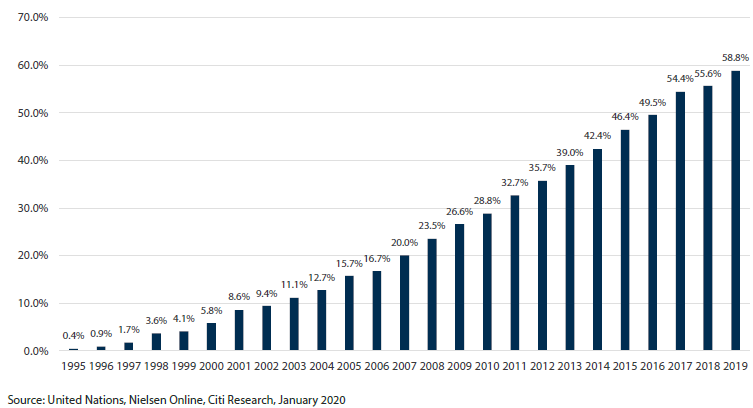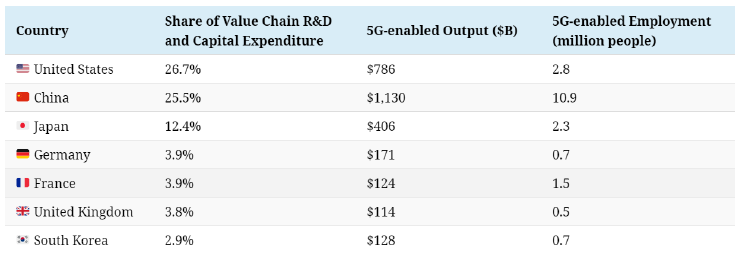Internet companies have gone from strength to strength, dramatically outperforming the broader market year-to-date. We believe that these companies have room for further growth, given the outsized role they are likely to play in a post-COVID-19 future.
Living in a digital age
In today’s hyper-connected world, we spend a significant portion of our lives online. The internet has enabled us to look up information within milliseconds, communicate with loved ones around the world, order groceries and consume entertainment—all at the snap of a finger. Internet companies have dramatically outperformed the broader market this year: they remained comparatively resilient during the market lows caused by COVID-19, and were quicker to rebound when markets subsequently recovered. Despite their strong performance year-to-date, we believe that global internet companies will continue to thrive in a post-COVID-19 economy. The following are some reasons why we believe that exposure to internet stocks could favour investors for the decades to come.
Internet companies are a major beneficiary of changing habits
Internet companies are likely to benefit from the changes brought about by the COVID-19 pandemic. Digital advancements are being accelerated out of necessity to facilitate a contact-free society, and the internet is the glue binding everyone together in these socially-distant times. Dr. Maxwell Maltz, the renowned American author of Psycho Cybernetics, suggested that habits require a minimum of 21 days to form. The epidemic has gone far beyond this duration and has created a long-lasting impact on consumers. These fundamental shifts are expected to benefit internet companies in the following ways:
- E-commerce is becoming the new norm. The pandemic has forced households to shift to the digital marketplace as an alternative to bricks-and-mortar stores to minimize risk of exposure to the virus.
- Digital communication is being prioritised. Greater quality of digital communication will be required to facilitate more effective remote working and more authentic human interactions.
- Digital entertainment is being favoured. Online gaming and video/music streaming services have become a way of life as consumers look to fill their time during periods of lockdown.
- Payments are becoming more digitised. This will be supported by an increase in volume of digital purchases as well as the fear of viral transmission via physical notes.
Vast potential increase in internet users globally
The global internet penetration rate was at 58.8% in 2019, suggesting that more than 40% of the world has yet to access the internet. These individuals will bolster demand in the technology sector once they have access. Economic and social progress will undoubtedly help their cause, but COVID-19 will likely also lead to increased internet adoption as we get used to a more digital-based way of life. One driving force is the continued rise in mobile data usage. According to Ericsson, global mobile data traffic is expected to increase by 27% annually from 2019 to 2025. And by 2025, almost 75% of web users are expected to access the internet solely using their smartphones, according to mobile trade body GSMA1.
Chart 1: Global internet penetration

Growth in supporting infrastructure: The 5G effect
At CES 2020, an annual trade show organised by the Consumer Technology Association, major carriers such as AT&T and Verizon projected that 2020 will be a turning point for 5G, where 5G networks are expected to proliferate and be accessible nationwide in the US.
5G is said to have download speeds 100 times faster than 4G, and it will be launching at an opportune time. Requirements for superfast internet connections will become a social and economic necessity after this pandemic to support the contact-free economy. Furthermore, Cisco reports that 5G connections are expected to generate 2.5 times more traffic than the average 4G connections and take up 10.6% of total mobile traffic by 20232.
5G will have profound effects on various industries. It will expand the possibilities of virtual reality and cloud gaming and improve the video/music streaming experience and Internet of Things (IoT) connections with smart devices at home, among others. This will in turn spur the growth of more digital data, allowing companies that are able to make sense of this enhanced volume of consumer data to further benefit from it.
Governments worldwide have also shown great willingness to support the development of 5G, serving as another impetus for its development. Table 1 shows Visual Capitalist’s estimate of the state of 5G development by 2035.
Table 1: Projected 5G development in 2035

Source: Visual Capitalist, March 2020
https://www.visualcapitalist.com/visualized-where-5g-will-change-the-world/
The question of valuations
While the iEdge-Factset Global Internet Index’s forward 12-month price-to-earnings (P/E) ratio of 42.8x appears to be high, we believe that this can be justified by expectations of strong earnings per share (EPS) growth for internet companies over the next few years. According to Bloomberg consensus forecasts, EPS for the Global Internet Index is expected to grow by 61.0% over the next 12 months. Thereafter, EPS is expected to increase by 16.4% and 26.4%, respectively, for the subsequent two years. Hence, the P/E ratio for the Global Internet Index is expected to decline to a more palatable 36.9x after two years and 29.1x after three years.
In addition, while the Global Internet Index is now trading at an enterprise multiple (EV/EBITDA) of 26.3x (forward 12-month), this is expected to fall to 23.2x and 18.7x, respectively, for the subsequent two years on the back of EBITDA per share growth of 36.8%, 13.5% and 24.1% respectively, for the next three years.
Looking to the future
As long-term investors, it is vital for us to consider what the future could look like. These are disruptive times, and the COVID-19 outbreak has only served to accelerate this disruption. When considering the shape of things to come, it is impossible for us to picture a world where e-commerce, social media, search engines and IOT companies do not have a major part to play. In our view, exposure to global internet companies could be a way for investors to future-proof their portfolios and position them well for the years ahead.
Footnote
2Source: Cisco annual internet report, https://www.cisco.com/c/en/us/solutions/collateral/executive-perspectives/annual-internet-report/white-paper-c11-741490.html


